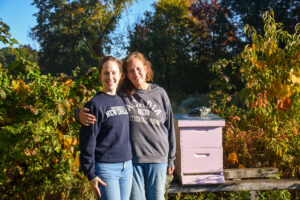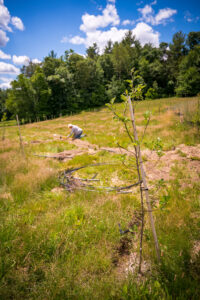
By Liz Nye, New England Botanic Garden Staff
April 2023
When Leslie Duthie’s two daughters were young, spring meant a trip to Hartford’s wholesale garden market. Leslie would give the girls, Stephanie and Monica, free reign to explore whatever they liked among the countless trees, shrubs, annuals, perennials, and hanging baskets available at the warehouse. Back at home, small garden plots waited in the yard. “I would prepare the soil,” Leslie says, “but they could pick out whatever they wanted and plant it.” Even roses, Stephanie recalls. Leslie, a lifelong gardener and botanist by profession, happens to hate roses. But that didn’t matter. The point of each annual gardening adventure wasn’t to agree on the merits of different plants. It was to experiment, explore, and spend time outdoors. In short, to experience all that’s good about gardening.
Last July, Stephanie, now 30, got to reconnect with these joys and more when she began a stint as a weekly horticulture volunteer here at New England Botanic Garden. The 8-month experience was a return, not only to gardening, but to those days spent gardening with her mom. Over the last five years, Leslie has given upwards of 1,700 volunteer hours to New England Botanic Garden on more than 350 days. She is at the Garden so often and so regularly that other volunteers sometimes think she is staff. While it’s possible to quantify Leslie’s volunteer time, summing up the tremendous positive impact she’s had on the team and the gardens during that time is a whole different story.
Each year, more than 300 people volunteer at New England Botanic Garden. They serve indoors in the conservatories and outdoors in the gardens helping the horticulture team to weed and plant. They also serve as event support, garden guides, youth educators, and more. Their contributions are essential not only to operations, but also to the Garden’s culture and community.
For both Stephanie and Leslie, volunteering started during times of transition. Stephanie was between job opportunities during the summer of 2022. When Leslie started in 2018, she was in the process of retiring, leaving behind a much-loved career in horticulture, 37 years of which were spent at Norcross Wildlife Sanctuary. Leslie says that having gardens to continue working in made all the difference. “Although I’m retired, it doesn’t mean that I don’t want to continue learning, and a big plus here was that I had a lot to learn,” she says.
Leslie’s passion and expertise center on New England’s native plants. While the Garden incorporates native plant species into many garden spaces and celebrates them in naturalistic gardens, woodlands, and meadows, there is also a world of cultivars, ornamental plants, and tropical plants from across the globe to discover while volunteering. In one of Leslie’s first projects, she took on labeling the conservatory collection. This tough task required someone with deep knowledge of botanical nomenclature, so Leslie was the perfect fit. Since then, her labeling efforts have extended to many different garden spaces, and she’s the authority behind the plant list naming and describing each of the orchids in the Garden’s annual orchid show.
 When Stephanie started volunteering, she often joined Leslie for tasks in the Garden’s historic heirloom apple orchard. Leslie was instrumental in the restoration of this orchard, a project initiated in 2018 in response to a fire blight outbreak. Fire blight is a fast-spreading bacteria that could have wiped out the entire collection if not for drastic action. Leslie worked with the Garden’s Horticulture Director Mark Richardson, Land Steward Robert Graham, and others to document apple varieties, support the grafting of new trees, and ultimately replant the orchard.
When Stephanie started volunteering, she often joined Leslie for tasks in the Garden’s historic heirloom apple orchard. Leslie was instrumental in the restoration of this orchard, a project initiated in 2018 in response to a fire blight outbreak. Fire blight is a fast-spreading bacteria that could have wiped out the entire collection if not for drastic action. Leslie worked with the Garden’s Horticulture Director Mark Richardson, Land Steward Robert Graham, and others to document apple varieties, support the grafting of new trees, and ultimately replant the orchard.
No matter what sort of volunteer work Leslie and Stephanie get up to, they always make a point of walking around the gardens together during their visit. As was true years ago, they still have a different garden aesthetic. “I hate straight lines,” Leslie says. “And I love them,” says Stephanie. But through their differences, they help each other notice things the other might have overlooked.
“Gardening takes a lot of patience,” Stephanie says. “Whether it’s work, family, or relationships, life can throw you a lot of different things, and I think gardening helps you remember how to be patient and wait for the reward.” It might come in the next season, or even the next five or ten years. Leslie agrees. For her, rewards are often found in the little things— “the small and insignificant” qualities of some plants that tend to go uncelebrated. These bring her joy.
Not all volunteer experiences at the Garden are like Leslie’s or Stephanie’s. While some volunteers sign up with a friend, family member, or group, others sign up on their own and enjoy meeting new people through their service. What’s true to any experience is the opportunity to learn, connect with others, spend time in nature, and make an impact—and in the best cases, this goes both ways.
“I just hope that I am able to contribute something to the Garden and contribute to the team’s experiences,” Leslie says. “Because everyone here contributes to mine.”
Don’t wait! As spring kicks into gear, learn more about how you can make a difference as a volunteer at New England Botanic Garden.
Liz Nye is the Public Relations Manager at New England Botanic Garden. She holds a master’s degree in science writing from Johns Hopkins University and enjoys learning about and writing about all things plants.
